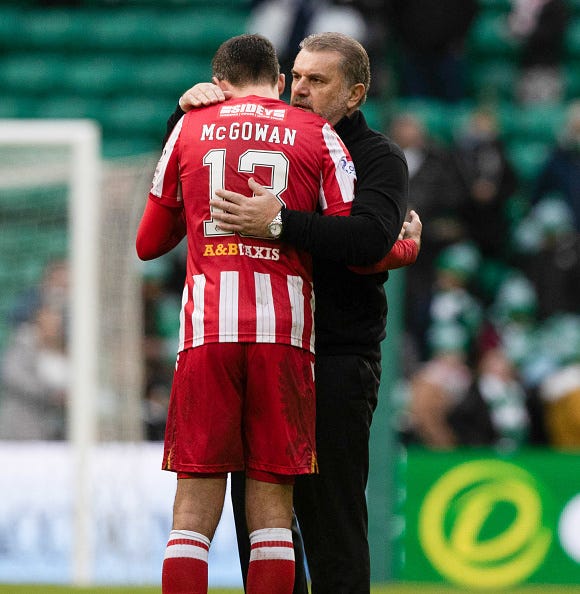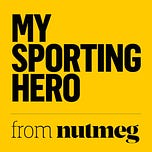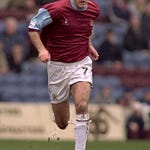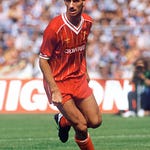In My Sporting Hero, a new podcast series from Nutmeg, footballers talk about the athletes who inspire them. Sometimes those sportsmen and women are also footballers. Sometimes not. You can listen to the audio on this post, on the podcast app of your choice (just search for ‘My Sporting Hero’) or enjoy the written version below.
Our next guest is Ryan McGowan.
Adelaide-born Ryan has proved a valuable and versatile asset for a host of clubs in Australia, China, the Middle East, England and Scotland, where he first pulled on the colours of Hearts as a teenager. The defender scored in the Jambos’ famous demolition of arch-rivals Hibs in the 2012 Scottish Cup final. In July, David Martindale signed him for Livingston as part of the Lions’ bid to return to the top flight. He has also been capped 21 times for the Socceroos, starring for them at the 2014 World Cup.
Ryan’s sporting hero is Tottenham Hotspur manager Ange Postecoglou, who was his boss at Australia Under-17s, under-20s and later the senior squad, and left an indelible impression on him.
I worked with Ange when I was with the Australian under-17 and under-20 teams. At that stage, I was trying to make my way in professional football and he was my first national team coach. I’d left Adelaide to play for Australia and I remember working with him and thinking how he was at such a different level to what I had been used to. It was the first time I learned the ins and outs of what it takes to be a professional and I remember realising how much more work I had to do. What he’s gone on to achieve has been so impressive, and for a fellow Aussie, it’s great to see. He just had a certain level of professionalism, charisma and tactical know-how and when I started working with other managers I realised how good he is.
When he came back to the national team as manager, I realised he had got even better. Then he went onto manage in Japan, at Celtic and now down at Tottenham, and the football is always good to watch. The way he got his point across on the training field was second to none, so when he went to Japan, I was intrigued to see how well he would do when not using his first language but he still had success. He’s so driven and clever in the way that he works and trains. When I was in the national team, the training would be harder than the matches because he would make the pitches smaller and it would be maybe one or two-touch football; he wanted you in that uncomfortable position when no-one was watching so that you felt comfortable when you went into a game scenario.
He had so much belief in what he wanted to achieve and how he wanted to play that you felt that you could make mistakes if you were doing things the right way. It was about taking risks to achieve rewards and our whole gameplan was simply to score more goals than the opposition. He was just so convincing that everybody was 100 percent behind him. He still has that control over the players because he’s just a really good manager to work for. I played a lot at right-back under him and I just remember feeling I had so many options when I was on the ball compared to, for example, when I played at Hearts or in China.
It was only when you started to do your own thing that there would be problems. There were plenty of team meetings when he went through boys because they weren’t doing what he had asked. And then there were other times when you thought he would go through somebody because they had made a mistake, but he would be the total opposite; he wouldn’t necessarily blame that player. And as much as he had that scary side, he could also make you feel pretty amazing when you did what he had asked you to do. Also, he treated every player the same, regardless of your profile or how many caps you had.
He knows exactly what type of player he wants because he doesn’t change how he plays, and in club football, obviously you can go out and buy that player. He knows that his midfielders have to be comfortable on the ball, or his striker has to be fast, or his wingers have to do a lot of work. Daizen Maeda is a good example, and not many wingers have that aerobic capacity to do what he wants.

He’s quite a hands-off manager and I’ve had more conversations with him since he’s been my manager. He was a lot calmer and happier to talk to me, whereas at the national team it was more of a professional work environment where we were both there to do our jobs. At the same time, you also felt that if you did need to speak to him, you could. I think I’ll always just call him ‘boss’; I don’t think I could ever call him ‘Ange’ – I’d be too embarrassed to even try! I just held him in such high regard. Wherever he has gone, he tries to take an Aussie with him, and if a fellow countryman ever reaches out to him, he’s more than happy to help in any way that he can.
He wanted his father to be proud of him and I think he just wants people to be proud of their clubs, proud of the players and have that real sense of community. He’s so good at getting everybody at the club pulling in one direction and I think as a fan that’s what you want to see. You want to see them playing an attractive style of football and you want to be excited to go along at the weekend.
I’ve been in lots of team-talks after which players have mocked the way the manager messed up a word or whatever, but never with Ange. He always delivered it perfectly and just hit the spot every time. You would wish you could have written it down or had it videoed, and you would walk out eager for the game. He would convey how football is a tiny insight into how life is, with all its ups and downs, and times when you need someone to help you out. I was probably a bit naive because I thought that everyone was going to be as good as him, because he was my first proper manager. It wasn’t until I’d travelled the world that I realised that not many were reaching his levels – and I’ve worked under some great managers who were great motivators but maybe lacked a bit tactically, whereas Ange just ticked every box.
The only time I was worried was when he first arrived at Celtic, because you can’t get off to a bad start there, and it didn’t go all that well at first. However, you could see right away that he had a clear vision of the way he wanted them to play, and the fans bought into that. They were not getting the results straight away, but there was a massive improvement, and they knew that if it did start clicking, they were going to be in for something special, and that’s what ended up happening. At Spurs, results haven’t been as consistent as they were at Celtic, but if you ask the majority of their fans, they’re coming along on a Saturday knowing that if it clicks then they’ll give themselves a great chance and it will be really good to watch.
I don’t know if I would have done as well in my career if he hadn’t been my under-17s manager. I just think he gave me a real insight into what it takes to be a footballer. When I arrived at Hearts, if I was struggling, I could hear his advice still ringing in my ears and I knew just to hang in there and work hard every day. And I like to think that when I was with the national team, he always knew what I would give him.











Share this post